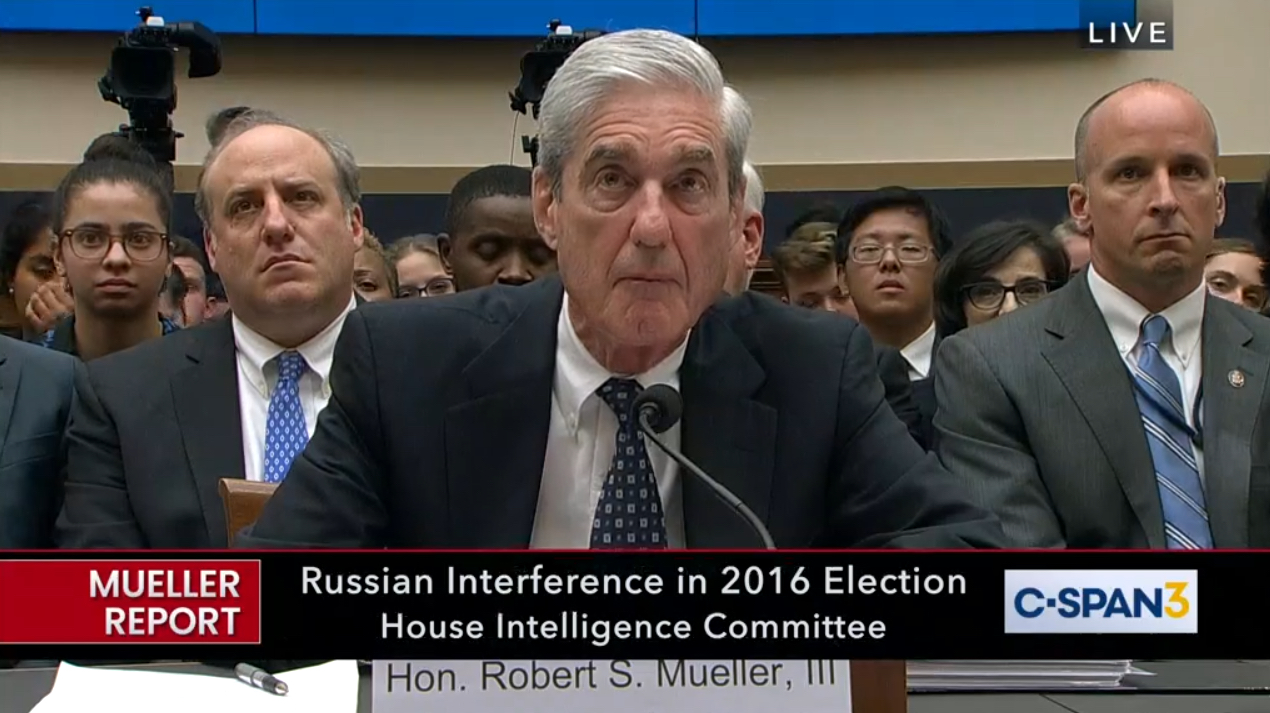Mueller’s Testimony: The Baton Passes to Congress
The former special counsel’s testimony is not ultimately important for any bombshells or revelations but for initiating the long-belated creation of an Article I record of the president’s conduct.

Published by The Lawfare Institute
in Cooperation With

There was something very sad about the atmospherics of today’s testimony by Robert S. Mueller III at the House Judiciary and Intelligence Committees—at least at first. It wasn’t just the frank and nearly absolute partisanship of both affairs, with interest in the substance of Mueller’s findings confined almost exclusively to the Democrats and interest in discrediting Mueller and his investigation emerging as the chief concern of nearly every Republican. It was Mueller himself, whose performance fell short of the commanding one his towering reputation had led so many to expect. He appeared halting much of the time. He was unable to answer some basic questions. He sometimes seemed confused both about what was being asked and about the contents of the report that colloquially bears his name.
As a matter of principle, Mueller said outright that he did not want to engage Congress beyond what was strictly necessary and appropriate for him to say. But even within those self-imposed constraints, he was having some trouble.
Yet Mueller’s testimony, notwithstanding the atmospherics, was a productive exercise. Over the course of the day, he seemed to gain confidence and by the end managed to have some genuinely moving exchanges with key members on important issues. He proved sharper, and more forthcoming, about matters directly related to President Trump in the afternoon Intelligence Committee hearing than he did in the morning before the Judiciary Committee. Perhaps he had better command over the subject matter of Russian electoral interference, which dominated the second half of the day, than he did over the discussion of obstruction that dominated the first half. Perhaps it was just his getting used to the high-pressure setting of public testimony after years out of the spotlight. But by the end of the Intelligence Committee hearing, he was offering thoughts and views that went ever-so-slightly beyond the four corners of the report itself. And they are thoughts and views every American should pause over.
Even apart from that, however, Mueller’s appearance today had a significance that outstrips any single thing he said. His testimony is not ultimately important for any bombshells or any revelations—of which there were none, in any event. Its significance, rather, lies in the hearings’ initiating of the long-belated creation of an Article I record of the president’s conduct—a shifting of the investigative locus from the executive branch to the legislative branch. That should have happened months ago. It finally happened today.
The Mueller report is an executive document, after all. When a member of Congress gets Mueller to answer questions about his findings at a hearing, his testimony becomes a part of a legislative record. That is in part a symbolic difference, since Congress is entitled to act on the basis of executive branch facts if it wishes. But there is still something important about Congress engaging the process, doing its own job, rather than sitting back on its heels waiting for Mueller to tell it what to do. While that process is not pretty, it is not trivial either. And it provides a basis for further congressional inquiry.
Because Mueller was true to his promises not to stray into discussions of ongoing investigations or investigations not within his purview, he did not offer many details on how he made his decisions. When asked about the contents of the report, he referred back to the report. This posed a challenge to both Republicans and Democrats. How does a member of Congress engage with such an intentionally untelegenic figure?
The Democratic members were ready to make a certain uneasy peace with this reality. Their preparation and coordination were unusually good for House members. They generally stuck to the four corners of the report. For the most part, they asked questions that Mueller could answer with one word: “Yes.” “Accurate.” “True.” Occasionally, he added a second word: “Generally true.”
And the Democrats split up the points to be made and issues to be covered. They coordinated on their key takeaway message, which different members repeated over and over again: The president had committed a range of obstructive acts and his campaign engaged in a multitude of alarming contacts with Russian-linked individuals. The result is that Democrats were able to lay down certain core substantive findings of the report about actions by Russians, by members of the campaign, by Trump administration officials like former White House counsel Don McGahn and by Trump himself. Over the course of the day, this became increasingly effective—even though many of the specific exchanges were merely members asking Mueller to verify the contents of his report.
Indeed, much of the Democratic effort consisted merely of eliciting such on-air confirmation of key facts sitting there in the document. Members walked Mueller through section after section of the report, with each member taking a different slice of the story. Their questions were most effective when they stuck to asking Mueller for simple yes-or-no answers. He often seemed uncomfortable when asked to respond at length. But over time, notwithstanding his reticence and discomfort and occasional confusion, they largely succeeded in sketching out the contents of the document, with the Judiciary Committee majority focused primarily on Volume II and the Intelligence Committee majority focusing more on Volume I.
On the Judiciary Committee, Chairman Jerry Nadler set up Democratic members to drill down on five specific instances of potential obstruction of justice by setting out the overall theme: that Trump’s claims of “total exoneration” and “no collusion, no obstruction” were badly misplaced. Here’s part of his exchange with Mueller:
NADLER: … Director Mueller, the President has repeatedly claimed that your report found there was no obstruction and that it completely and totally exonerated him, but that is not what your report said, is it?
MUELLER: Correct. That is not what the report said.
NADLER: . . . [Y]ou wrote, quote, “If we had confidence after a thorough investigation of the facts that the president clearly did not commit obstruction of justice, we would so state. Based on the facts and the applicable legal standards, however, we are unable to reach that judgment,” close quote. Now does that say there was no obstruction?
MUELLER: No.
Democrats moved on to examine specific instances of potential obstruction. Rep. Steve Cohen, for example, questioned Mueller regarding Attorney General Jeff Sessions’s recusal from the Russia probe.
COHEN: Wasn’t Attorney General Sessions following the rules and professional advice of the Department of Justice ethics folks when he recused himself from the investigation?
MUELLER: Yes.
COHEN: And yet, the president repeatedly expressed his displeasure at Sessions’s decision to follow those ethics rules, to recuse himself from oversight of that investigation. Is that not correct?
MUELLER: That’s accurate, based on what is written in the report.
….
COHEN: In fact, your investigation found that at some point after your appointment, quote, “the president called Sessions at his home and asked if he would un-recuse himself.” Is that not true?
MUELLER: It’s true.
Democrats also pushed Mueller to clarify the legal reasoning behind the report. The former special counsel assented in response to a question from Rep. Debbie Mucarsel-Powell as to whether an unsuccessful attempt to obstruct justice could still be a crime. Rep. Ted Lieu asked Mueller to explain the role played by the Office of Legal Counsel memo forbidding indictment of the president. Mueller briefly seemed to say that he “did not indict Donald Trump ... because of the OLC opinion”—suggesting that the OLC opinion played a greater role than he had previously stated—though he then walked that back in his opening remarks before the House Intelligence Committee. Meanwhile, other Democrats tried to push Mueller into spelling out how he saw the interaction between his report and the possibility of impeachment, though Mueller seemed skittish around the word. Rep. Veronica Escobar got the farthest:
ESCOBAR: Director Mueller, at your May 29, 2019 press conference, you explained that, quote, “the [OLC] opinion says that the Constitution requires a process other than the criminal justice system to formally accuse a sitting President of wrongdoing”, end quote. That process other than the criminal justice system for accusing a President of wrongdoing, is that impeachment?
MUELLER: I’m not going to comment on that.
ESCOBAR: In your report, you also wrote that you did not want to quote “potentially preempt constitutional processes for addressing presidential misconduct,” end quote. For the non-lawyers in the room, what did you mean by “potentially preempt constitutional processes”?
MUELLER: I’m not going to try to explain that.
ESCOBAR: That actually is coming from page one, Volume II—in the footnote is the reference to this. What are those constitutional processes?
MUELLER: I think I heard you mention at least one.
On the Intelligence Committee, Rep. Sean Patrick Maloney quizzed Mueller on the written responses to questions by Trump:
MALONEY: What did you think of the President's written responses, Mr. Mueller?
MUELLER: Certainly not as useful as the interview would be.
In an exchange with Rep. Val Demings, Mueller—after initially resisting the question—even stated that he had not found the president’s written answers credible:
DEMINGS: Could you say, Director Mueller, that the president was credible?
MUELLER: I can’t answer that question.
DEMINGS: Director Mueller, isn’t it fair to say that the president’s written answers were not only inadequate and incomplete because he didn’t answer many of your questions, but where he did his answers showed that he wasn’t always being truthful?
MUELLER: I would say generally.
Others on the Intelligence Committee teased out Mueller’s personal concerns about election interference and the response of the president’s campaign. Asked by Rep. Peter Welch whether he “share[d] [Welch’s] concern” that election interference had become “the new normal,” Mueller responded, “I hope this is not the new normal, but I fear it is.” In an exchange with Rep. Mike Quigley, Mueller directly criticized the president’s conduct regarding Trump’s use of information provided by WikiLeaks during the 2016 campaign:
QUIGLEY: Would it be fair to describe [WikiLeaks] as ... a hostile intelligence service?
MUELLER: Yes.
QUIGLEY: If we could put up slide six. “This just came out. WikiLeaks. I love WikiLeaks.'' Donald Trump, Oct. 10, 2016. “This WikiLeaks stuff is unbelievable. It tells you the inner heart. You've got to read it.” Donald Trump, Oct. 12, 2016. “This WikiLeaks is like a treasure trove.” Donald Trump, October 21, 2016. “Boy, I love reading those WikiLeaks.” Donald Trump, Nov. 4, 2016. Would any of those quotes disturb you, Mr. Director?
...
MUELLER: Well, it's probably—problematic is an understatement in terms of what it displays in terms of giving some, I don't know, hope or some boost to what is and should be illegal activity.
The Democratic questioning culminated with Mueller’s interview with Schiff. In an initial exchange, Mueller told the chairman that his investigation was “not a witch hunt.” But the real force of Schiff’s questioning—and the remarks with which he opened the Intelligence Committee’s hearing—was on the counterintelligence dangers and ethical failures highlighted by the report.
SCHIFF: From your testimony today I'd gather that you believe that knowingly accepting foreign assistance during a presidential campaign is an unethical thing to do.
...
MUELLER: And a crime, given certain circumstances.
SCHIFF: To the degree that it undermines our democracy and our institutions, we can also agree that it's also unpatriotic.
MUELLER: True
SCHIFF: And wrong.
MUELLER: True.
This, along with Mueller’s exchange with Quigley regarding WikiLeaks, was one of the few instances during the hearings in which Mueller seemed to pass moral, as well as prosecutorial, judgment. But Schiff also moved toward a discussion of the counterintelligence risks of such moral failings.
SCHIFF: The need to act in an ethical manner is not just a moral one. When people act unethically it also exposes them to compromise, particularly in dealing with foreign powers, is that true?
MUELLER: True.
SCHIFF: Because when someone acts unethically in connection with a foreign partner, that foreign partner can later expose their wrongdoing and extort them.
MUELLER: True.
Schiff went on to point to Michael Flynn and Michael Cohen as examples of Trump associates opening themselves up to “counterintelligence nightmares” through lies and financial dealings—to which Mueller assented. (Earlier, in response to a question about Michael Flynn, he commented to Rep. Raja Krishnamoorthi that “there are many elements of the FBI looking at different aspects” of the possible national security risks raised by lies that open officials up to blackmail.)
While Democrats were trying to tell the story set out in the report and push Mueller to go ever-so-slightly further in his analysis of the president’s conduct than he did in that document, Republicans had a different goal: to discredit Mueller’s investigation and sometimes the man himself. This generally took the form of hammering certain common themes outside the text of the report, including the text messages between FBI officials Peter Strzok and Lisa Page and the reliability of the information contained in the Steele dossier. Mueller usually refused to engage these theories on the grounds that they had been or are being addressed by other investigative bodies, that they involved internal deliberations, or simply that they were outside of the scope of his investigation. He began his testimony by pointing to a Justice Department letter asserting executive privilege over matters outside the report, specifically noting the Steele dossier.
Though this didn’t stop Republicans from pushing Mueller on such points, it did prevent them from developing any kind of significant record related to the issues.
One notable feature of the day was that the Republicans essentially accepted the assertions of the Mueller report as factual. By and large, they did not seek to contest the facts Mueller reported, but rather attacked alleged bias and the legal significance of the facts in the document. One of the functions of the report was to establish a common set of facts, and today’s hearing—in its own peculiar way—suggests that it has done that, at least to a point. The Republican members’ questions did not seem to doubt that McGahn was telling the truth and that Trump was lying. They accepted that Trump had asked Corey Lewandowski to get Sessions to unrecuse. While they fought on other matters, they didn’t contest the factual ground that Mueller has staked out.
Republican members certainly scored some points on the former special counsel. Rep. Louie Gohmert managed to get him to say that he and Jim Comey are “friends,” after Mueller had first insisted they were merely “business associates.” Early in the Judiciary Committee hearing, questioning from Ranking Member Doug Collins appeared to confuse Mueller as to whether the report treated “collusion” and “conspiracy” as synonymous, leading Mueller to appear to contradict his own report before backtracking. And Mueller was confronted a number of times with the partisan preferences of his prosecutorial team, before he finally said—in an exchange with Rep. Kelly Armstrong—that he had never asked people about their political views before hiring them: “What I care about is the capability of the individual to do the job and do the job quickly and seriously and with integrity.”
Other Republicans launched more targeted criticisms of Mueller’s handling of the probe, focusing on decisions that were purportedly inconsistent with either standing Justice Department practices or Mueller’s decisions in other contexts. Rep. John Ratcliffe was only one of several Republicans to focus on Mueller’s declaration that he could not exonerate the president:
RATCLIFFE: [C]an you give me an example other than Donald Trump, where the Justice Department determined that an investigated person was not exonerated because their innocence was not conclusively determined?
MUELLER: I cannot, but this is a unique situation.
RATCLIFFE: ... [N]owhere does it say that you were to conclusively determine Donald Trump’s innocence, or that the Special Counsel report should determine whether or not to exonerate him. ... Respectfully, Director, it was not the special counsel’s job to conclusively determine Donald Trump’s innocence or to exonerate him. Because the bedrock principle of our justice system is a presumption of innocence.
But a great deal of the Republican questioning was devoted to asking Mueller to account for conspiracy theories. For example, several members asked about Mueller’s decision not to pursue criminal charges against Joseph Mifsud for allegedly lying to the FBI. The issue came up most pointedly in an exchange with Rep. Jim Jordan, who drew a sharp, accusatory contrast between the various false statements cases Mueller brought with the absence of charges against Mifsud—all against the backdrop of the completely unfounded suggestion that Mifsud is a front for Western, not Russian, intelligence interests (for a deep dive on this conspiracy theory and on Mifsud himself, see this recent Washington Post story):
JORDAN: [Mifsud] is the guy who starts it all, and when the FBI interviews him, he lies three times and yet you don’t charge him with a crime…. And I’m curious as to why.
MUELLER: Well, I can’t get into it and it’s obvious I think that we can’t get into charging decisions.
JORDAN: . . . [W]hen the Special Counsel’s Office interviewed Mifsud, did he lie to you guys too?
MUELLER: Can’t get into that.
JORDAN: Did you interview Mifsud?
MUELLER: Can’t get into that.
JORDAN: Is Mifsud Western intelligence or Russian intelligence?
MUELLER: Can’t get into that.
JORDAN: A lot of things you can’t get into. What’s interesting, you can charge 13 Russians no one’s ever heard of ... you can charge all kinds of people who are around the president with false statements but the guy who launches everything, the guy who puts this whole story in motion, you can’t charge him. I think that’s amazing.
Not every Republican member committed the entirety of his or her time to conspiracy theories. Rep. Martha Roby engaged in respectfully adversarial questioning concerning Mueller’s interactions with Attorney General Barr surrounding the release of the report in its redacted form, focusing on concerns Mueller might have had regarding Barr’s representatives of its contents prior to its release. Roby closed by pointedly asking Mueller whether he had leaked his Mar. 27 letter to Barr in an effort to correct Barr’s narrative; though Mueller ultimately refused to discuss the internal deliberations surrounding the report’s release, there was nothing illegitimate about the line of inquiry.
Exactly one Republican focused on substance. Rep. Will Hurd questioned Mueller on his views of some of the policy issues raised by the Russian disinformation campaign, ultimately leading Mueller to suggest—in agreement with Hurd—that such capabilities are not limited to Russia and would almost certainly be attempted again in regard to future U.S. elections.
HURD: Our committee issued a report saying that Russian active measures are growing with frequency and intensity and including their expanded use of groups such as the [Internet Research Agency]. And these groups pose a significant threat to the United States and our allies in upcoming elections. Would you agree with that?
MUELLER: Yes. In fact, one of the other areas that we have to look at [is that] . . . many more countries are developing the capability to replicate what the Russians have done.
. . .
HURD: [D]id you think this was a single attempt by the Russians to get involved in our election, or did you find evidence to suggest they'll try to do this again?
MUELLER: It wasn't a single attempt. They’re doing it as we sit here. And they expect to do it during the next campaign.
All in all, Mueller’s low-key performance probably didn’t give either the majority or the minority what they might have hoped for. But the incomplete nature of his testimony was, in a way, the point. At the hearings’ end, Schiff closed by noting the many things Mueller had not done: He had not told Congress whether he would have indicted the president in the absence of the OLC memo; he had not said whether the president should be impeached; he had not spoken to the findings of any counterintelligence investigation or of any investigation into corrupt financial dealings within the administration. In each instance, Schiff said, Mueller had acted properly; the responsibility was not the former special counsel’s, but that of Congress. Schiff’s remarks were a kind of mustering call for the House, an acknowledgement to Mueller that the former special counsel’s role was over and that he had successfully passed the baton to the legislative branch.
Whether the legislature is actually in a position to take the baton is an open question.
Schiff did not stake out specific next steps, but there is an obvious follow-up move for Congress in the wake of the Mueller hearings: calling fact witnesses and hearing from them directly. Where Mueller declined to answer questions or referred to his report to answer them, or declined to make judgments, that forces Congress—having heard from him directly that he won’t tell members how to render judgments or assess witnesses or assess presidential conduct—to hear from those witnesses themselves and render those judgments themselves.
That may now be happening. Shortly after the hearings ended, the Wall Street Journal reported that the House Judiciary Committee was preparing to file a lawsuit to enforce a subpoena for testimony from McGahn. Apparently the committee and the White House have been unable to agree whether his appearance would be public or private. Both parties clearly understand how significant McGahn’s public testimony could be.
The process of building a legislative record, having begun, may be acquiring a little momentum.














